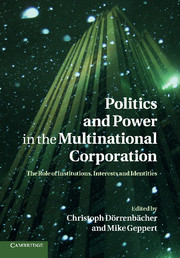 Politics and Power in the Multinational Corporation
Politics and Power in the Multinational Corporation Book contents
- Frontmatter
- Contents
- List of figures
- List of tables
- Notes on contributors
- Foreword
- Part I Introduction
- Part II Politics and power in MNCs: institutions, social embeddedness and knowledge
- 2 Resource dependence and construction, and macro- and micro-politics in transnational enterprises and alliances: the case of jet engine manufacturers in Germany
- 3 Bargained globalization: employment relations providing robust “tool kits” for socio-political strategizing in MNCs in Germany
- 4 Bridging roles, social skill and embedded knowing in multinational organizations
- Part III Politics and power in MNCs: headquarters–subsidiary relations
- Part IV Politics and power in MNCs: role of national identities and identity work
- Part V Conclusions
- Index
- References
3 - Bargained globalization: employment relations providing robust “tool kits” for socio-political strategizing in MNCs in Germany
Published online by Cambridge University Press: 26 April 2011
- Frontmatter
- Contents
- List of figures
- List of tables
- Notes on contributors
- Foreword
- Part I Introduction
- Part II Politics and power in MNCs: institutions, social embeddedness and knowledge
- 2 Resource dependence and construction, and macro- and micro-politics in transnational enterprises and alliances: the case of jet engine manufacturers in Germany
- 3 Bargained globalization: employment relations providing robust “tool kits” for socio-political strategizing in MNCs in Germany
- 4 Bridging roles, social skill and embedded knowing in multinational organizations
- Part III Politics and power in MNCs: headquarters–subsidiary relations
- Part IV Politics and power in MNCs: role of national identities and identity work
- Part V Conclusions
- Index
- References
Summary
Germany has somehow managed to create a high-wage, unionized economy without shipping all its jobs abroad or creating a massive trade deficit, or any deficit at all … Why is Germany beating us?
(Geoghegan 2010: 7)Introduction
The above quote appeared in a recent edition of Harper's Magazine in the USA and raises some interesting questions by contrasting distinctive management and employment practices in the German manufacturing sector with current dilemmas faced by firms situated in and originating from liberal market economies in the wake of the recent financial crisis. In this chapter we seek to explain why these distinctive practices remain robust in the face of pressures from globalization, based on a survey of some of the current literature on plant-level employment relations in Germany. Our survey focuses on the important role played by local managers and workers' representatives as socio-political strategists, who are able to draw on critical power resources within multinational companies (MNCs) operating in Germany to safeguard skills and jobs in German plants.
In the first part of the chapter we reflect on ideas that stress the importance of local institutions and the role of local actors for institution building in transnational social spaces, referring to the idea of the MNC as a “contested terrain” (Edwards and Bélanger 2009; see also chapter of Morgan in this volume). We look at emerging opportunities for socio-political strategizing by local actors in Germany and link these to institutional resources provided by the German model of employment relations, which provide local actors with critical resources.
- Type
- Chapter
- Information
- Politics and Power in the Multinational CorporationThe Role of Institutions, Interests and Identities, pp. 72 - 100Publisher: Cambridge University PressPrint publication year: 2011
References
- 20
- Cited by


